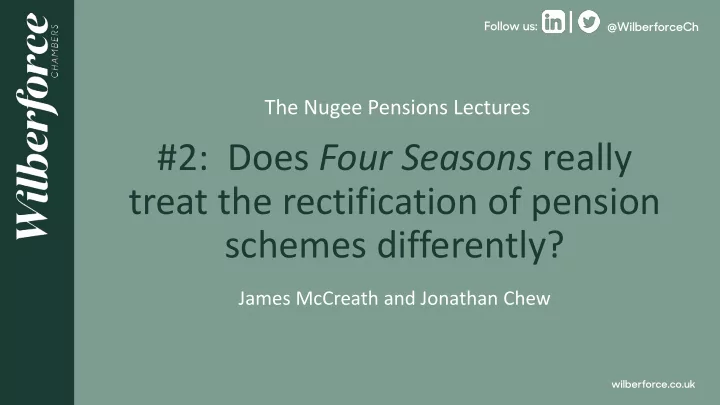

Follow us: @WilberforceCh The Nugee Pensions Lectures #2: Does Four Seasons really treat the rectification of pension schemes differently? James McCreath and Jonathan Chew wilberforce.co.uk
How have we got here? Chartbrook v Persimmon • Judge accepted landowners’ evidence as to subjective intention • House of Lords held that what mattered was objective intention Follow us: wilberforce.co.uk
Four Seasons • Security documentation created a primary obligation • At first instance held that: • Not intended objectively • Not intended subjectively • Rectification granted • Court of Appeal upheld decision on objective Follow us: intention wilberforce.co.uk
Four Seasons • BUT held that subjective intention what mattered • Intention a matter of psychological fact • Requirement in contractual cases for an outward expression of accord • Pension cases different – coincidence not accord enough Follow us: wilberforce.co.uk
“Outward Expression of Accord” A substantive requirement for contracts: [176] Reason (1): Correct recording error, not make bargain Reason (2): mutual agreement and objective intention Follow us: Reason (3): Caprice to rectify on unknown intention wilberforce.co.uk
“Outward Expression of Accord” But pension schemes are different (apparently…) Gallaher : specifically held evidential requirement only However: Reason (4): “Consent” wording different to agreement Reason (5): Trust/pension consent qualitatively Follow us: different to contractual agreement wilberforce.co.uk
“Outward Expression of Accord” Do the reasons work? (1): recording errors: true for pensions as anything (2): “objective intention”: no suggestion schemes different (2): “mutual assent”: POA is “mutual” Follow us: (3): caprice: Ts/PEs/members all need to know where they stand wilberforce.co.uk
“Outward Expression of Accord” Do the reasons work? (4): “Consent” ≠ “agreement”: is it really? turn on choice of word? (5): Pension agreement ≠ contractual agreement On what basis? Different legal form ≠ different substantive Follow us: “agreement” wilberforce.co.uk
“Outward expression of accord” Nevertheless, has been applied: Blatchford [2020] Pens LR 5; Colart [2020] Pens LR 3 More broadly, what evidential/litigation impact will this new test have… Follow us: wilberforce.co.uk
Does rectification really require ‘cogent’ evidence? • ‘Cogency’ evidential not legal – AMP v Barker • Reflects a presumption that the written instrument is the best reflection of the parties’ intended: “It is not, I think, the standard of proof which is high, so differing from the normal civil standard, but the evidential requirement needed to counteract the inherent probability that the written instrument Follow us: truly represents the parties’ intention because it is a document signed by the parties” wilberforce.co.uk
Does rectification really require ‘cogent’ evidence? • Logic in contractual cases • Can be expected to understand one-off contract • Merit in warding off speculative claims – see e.g The Olympic Pride Follow us: wilberforce.co.uk
Who needs to give evidence? • Does subjective intention require evidence from all involved? • Documents the basis of an inference as to subjective intention • Witness evidence direct evidence Follow us: wilberforce.co.uk
Who needs to give evidence? • Increasing judicial acceptance of the fallibility of human memory: Gestmin v Credit Suisse • Not just a matter of the passage of time: memory inherently unreliable • Little chance in practice of objective and subjective intentions diverging • Pension cases often about lack of intention Follow us: wilberforce.co.uk
Corporate Decision-Makers Rules of attribution/ Meridian Global [1995] 2 AC 500 : Necessary part of corporate personality: Primary (constitution; default rules of company law) General (common law of agency) “Special”: law needs to find an answer Follow us: wilberforce.co.uk
Corporate Decision-Makers Application to pension schemes: IBM [2012] Pens LR 469: “Management Committee” decision maker in fact Held: within delegated authority from board Notwithstanding lack of doc evidence: [94(vii)] Appears primary rule of corporate decision-making Follow us: delegation (query general agency) wilberforce.co.uk
Corporate Decision-Makers Practical Lessons on Attribution: Exercise is factual and legal Factual: who made the decision Negotiators vs Decision-Makers: Hawksford Trustees Legal: why does that bind the company Follow us: Need to satisfy primary or general rule: identify chain of authority wilberforce.co.uk
Corporate Decision Makers What is a board’s “subjective” intention for rectification purposes? 1) Internal discussion/decisions recorded in board documents not shared with outside world 2) Unexpressed coincident views of members. Follow us: If (1), how is this different to objective intention? If (2), how do you prove it? wilberforce.co.uk
Corporate Decision-Makers Given specific context of boards and scheme “consent” reasoning, does FSHC make a difference? 1. You still need to show what the board decided; 2. For pensions, still no need to show outward expression of accord Follow us: A doctrinal change neutered by evidence? wilberforce.co.uk
Follow us: @WilberforceCh Thank you (and (more) questions?)
Recommend
More recommend